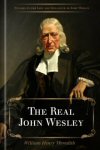Studies on the Life and Influence of John Wesley (16 vols.)
Digital Logos Edition
Overview
John Wesley is one of the most influential Christian leaders in history. The Studies on the Life and Influence of John Wesley collection features a variety of perspectives on Wesley’s life that demonstrate the nature and degree of his impact on the church and modern society. These classic texts explore Wesley through interpretive biographies, critical studies, primary documents, and topical vignettes.
With the Logos editions, these valuable volumes are enhanced by amazing functionality and features. Scripture and ancient-text citations link directly to English translations and original-language texts, and important terms link to dictionaries, encyclopedias, and a wealth of other resources in your digital library. Perform powerful searches with the Topic Guide to instantly gather relevant biblical texts and resources. Tablet and mobile apps let you take the discussion with you. With Logos Bible Software, the most efficient and comprehensive research tools are in one place, so you get the most out of your study.
Looking for more resources on John Wesley? Check out the John Wesley Collection (29 vols.).
This title is included in the following collections
You can save when you purchase this product as part of a collection.
Logos 8 Methodist & Wesleyan B...
$89.99$89.99Logos 8 Methodist & Wesleyan S...
$349.99$349.99Logos 9 Methodist & Wesleyan S...
$349.99$349.99Logos 8 Methodist & Wesleyan G...
$849.99$849.99
- $849.99
- $849.99
- $849.99
- $1,499.99
- $1,499.99
- $1,499.99
- $2,999.99
- $21,749.99
- $24,999.99

Key Features
- Features several comprehensive biographies on John Wesley
- Identifies and answers specific historical questions regarding Wesley and his ministry
- Examines Wesley’s relationship to Methodism and other movements
- Provides selections from Wesley’s diary and letters
Product Details
- Title: Studies on the Life and Influence of John Wesley
- Volumes: 16
- Pages: 5,249
Individual Titles
- The Life of John Wesley; and Rise and Progress of Methodism, vol. 1 by Robert Southey
- The Life of John Wesley; and Rise and Progress of Methodism, vol. 2 by Robert Southey
- Wesley, and Methodism by Isaac Taylor
- John Wesley: His Life and His Work by Matthew Lelievre
- John Wesley by James J. Ellis
- The Heart of John Wesley’s Journal by John Wesley
- Original Letters by the Rev. John Wesley, and His Friends by John Wesley
- The Life of the Rev. John Wesley, A. M. with Memoirs of the Wesley Family. To Which are Subjoined, Dr. Whitehead’s Funeral Sermon, and a Comprehensive History of American Methodism by George Bourne
- Letters of John Wesley: A Selection of Important and New Letters with Introductions and Biographical Notes by John Wesley and George Eayrs
- John Wesley and the Evangelical Reaction of the Eighteenth Century by Julia Wedgwood
- John Wesley and Modern Religion by Umphrey Lee
- John Wesley as a Social Reformer by D. D. Thompson
- Studies in the Life of John Wesley by E. B. Chappell
- Wesley the Worthy, and Wesley the Catholic by O. T. Dobbin
- Wesley and Methodism by F. J. Snell
- The Real John Wesley by William Henry Meredith
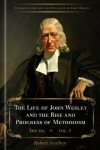
Methodism expanded faster than any other social movement in British North America. Beginning with John Wesley’s great grandfather Bartholomew Wesley, and ending with the earliest days of Methodism, volume 1 of Robert Southey’s The Life of John Wesley and the Rise and Progress of Methodism, presents the narrative of John Wesley’s early life. Southey describes the formative period of Wesley’s life in detail, and explains how his teachings gave birth to Methodism.
Robert Southey was an English Romantic poet and historian. Southey was a Poet Laureate for 30 years, and a member of the “Lake Poets,” a group which also included William Wordsworth and Samuel Taylor Coleridge. His biographical works examined leading sixteenth and seventeenth-century British figures such as John Bunyan, William Cowper, Oliver Cromwell, and Horatio Nelson. A distinguished scholar of Spanish and Portuguese language and history, he translated many books into English. He also wrote History of Brazil and History of the Peninsula War. Southey was educated at Westminster School, London, and at Balliol College, Oxford. His most enduring contribution to literature was the children’s book The Story of the Three Bears, known today as “Goldilocks.”
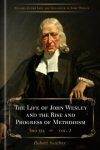
Volume 2 of Robert Southey’s The Life of John Wesley and the Rise and Progress of Methodism, begins with earliest stages of Methodism and narrates its development alongside the life of John Wesley. Southey traces Methodism’s rapid expansion, notes its opponents, and describes the definitive influence it exercised on early American culture.
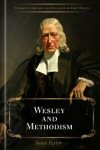
As the founder, John Wesley’s influence on Methodism is often assumed. In Wesley and Methodism Isaac Taylor explores the degree of John Wesley’s ongoing influence on Methodism, noting the differences between Wesley and other Methodist leaders such as George Whitefield, John William Fletcher, and Charles Wesley. Taylor also considers the degree of Wesley’s influence on the generations after his death, as well as the prospects for continued influence in the Methodist Church.
Isaac Taylor (1787–1865) was an English philosopher, historian, scientist, and artist. He served as the editor of the Eclectic Review and wrote many books, including Home Education, Ancient Christianity and the Doctrines of the Oxford Tracts, The Restoration of Belief, Logic in Theology and Ultimate Civilisation, and The Spirit of Hebrew Poetry.
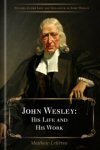
Matthew Lelievre’s John Wesley: His Life and His Work is a popular biography of the great Methodist founder. Originally intended for French Methodist’s, this volume covers Wesley’s entire life—from his birth to Alder’s gate, and from his success as an itinerant preacher to the rise and spread of Methodism.
Matthew Lelievre was a French historian and biographer. He wrote many books including The Alpine Missionary. He served as a delegate to the English Wesleyan Conference in 1884, as publisher at Librairie Evagelique, and as editor of L’ Evangeliate, a French Methodist periodical.
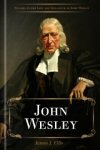
Written to commemorate the centenary of John Wesley’s death, James Ellis’ John Wesley presents an accessible account of John Wesley’s life, ministry, and influence. Based on primary resources, first-hand testimony, and secondary literature, Ellis’ biography provides a lively and reverent narrative.
James J. Ellis was a writer, theologian, and biographer. A remarkably prolific writer, Ellis often wrote several books per year. His biographical works include Abraham Lincoln, John Williams: The Martyr Missionary of Polynesia, Charles Kingsley, James Hudson Taylor: A Little Man Who Did Great Things for God, Lord Shaftesbury, William Tyndale, and Charles Haddon Spurgeon. His theological works include Marked for Death, Message of Christ, and Take Fast Hold.
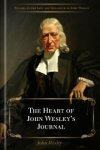
The Heart of John Wesley’s Journal presents readers with a selection of Wesley’s most intimate journal entries, including his reaction to George Whitefield, his thoughts on preaching by his father’s tomb, and his thoughts on his mother, Susanna Wesley. Journal entries span John Wesley’s entire life.
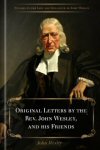
John Wesley was known for his great compassion, and his correspondence with friends and family demonstrates his strong moral character. Here readers will find a very approachable Wesley who is open and vulnerable to friends and family about everyday problems. He asks difficult questions about faith, and openly expresses gratitude and love for others.
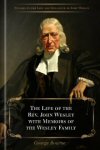
The Life of the Rev. John Wesley, A. M. with Memoirs of the Wesley Family. To Which are Subjoined, Dr. Whitehead’s Funeral Sermon, and a Comprehensive History of American Methodism
- Author: George Bourne
- Publisher: George Dobbin and Murphy
- Publication Date: 1807
- Pages: 352
Part biography and part apologia, this volume seeks to clarify debated and obscure events from John Wesley’s life. George Bourne gently corrects popular rumors, treats Wesley’s detractors with respect, and provides an edifying account of John Wesley’s life.
George Bourne (1780–1845) was an American abolitionist and Presbyterian minister. Widely acknowledged as the first to publicly proclaim “immediate emancipation without compensation,” he worked indefatigably against slavery, causing William Lloyd Garrison to say of him, “Never has slavery had a more indomitable foe or freedom a truer friend.” Bourne was also a successful writer, and his The Book and Slavery Irreconcilable was a key ideological tract spurring Christian abolitionism. His other works include Napolean Bonaprte, and the now lost Thomas Jefferson and His Presidency. Bourne edited several periodicals, including the Christian Intelligencer, and the Baltimore Daily Gazette. He founded the Protestant Reformation Society, which later became the American Foreign Christian Union.
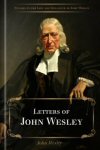
John Wesley’s letters are as important as his diaries for understanding his ministry and character. The Letters of John Wesley presents selections from Wesley’s most important and intimate letters. W. H. Fitchett introduces the collection with a vignette on Wesley’s character, and Augustine Birrell supplements Fitchett’s essay with a succinct account of Wesley’s life and ministry. The remainder of the volume contains Wesley’s personal and professional letters—more than 400 pages of personal correspondence.
George Eayrs (1864–1926) was a Methodist minister and historian. He is the author of Alfred to Victoria: Hands Across a Thousand Years, John Wesley: Christian Philosopher and Church Founder, British Methodism, and Wesley and Kingwood and Its Free Churches.
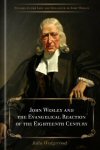
This volume documents the influence of John Wesley on his own era. One of the earliest critical treatments of Wesley’s significance, John Wesley and the Evangelical Reaction of the Eighteenth Century carefully examines his relationship with various people and movements including the Moravians, Calvinists, Anglicans, fellow Methodists, George Whitefield, and the secular world.
Julia Wedgwood (1833–1913) was an English novelist, historian, philosopher, and literary critic. She was particularly enamored with the relationship between science and faith, and was known as a “brilliant conversationalist” with a passion for debate. Though she had scant formal education, she taught herself Greek, Latin, German, and French. She wrote several books, including An Old Debt, The Moral Ideal, and The Message of Israel.
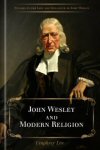
John Wesley influenced his own era perhaps more than any of his contemporaries. But did he influence Christianity beyond the eighteenth century? In John Wesley and Modern Religion, Umphrey Lee uses his historical distance from Wesley to provide a sober assessment of Wesley’s effect on the twentieth-century church. Part academic biography and part interpretive analysis, Lee’s work establishes Wesley as a perennial force in the modern world.
Umphrey Lee (1863–1958) was president of Southern Methodist University. He also served as dean at Vanderbilt University, and he established the Wesley Bible Chair at the University of Texas. He ministered at Highland Park Methodist Church on the campus of SMU, and was a member of the Medieval Academy of America, the American Historical Society, the American Society of Church History, and the Philosophical Society of Texas. His many books include The Lord’s Horseman and Our Fathers and Us: The Heritage of the Methodists.
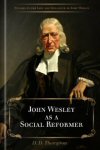
John Wesley was influential in many ways, but his most definitive impact was in personal holiness and public morality. John Wesley as a Social Reformer explores this influence and argues that Wesley did more to incite evangelical Christians to public service than any previous church leader.
D. D. Thompson (1852–1908) served as editor of the Northwest Christian Advocate, and is the author of Abraham Lincoln, The First American.
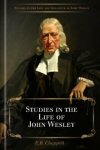
Though historians have access to a library of primary sources regarding John Wesley, many critical questions remain. Studies in the Life of John Wesley addresses these questions by reconstructing the events of his life in detail. Where necessary, author E. B. Chappell notes gaps in the Wesley narrative and zooms in on the questions requiring clarification, while providing compelling arguments for his conclusions.
E. B. Chappell was a distinguished educator and leader in the Episcopal Methodist Church. He is known for his trenchant call in the early twentieth century for the Methodist Church to return to its spiritual vitality rooted in the primacy of Scripture. He was a delegate to the Joint Commission on Unification of the Methodist Episcopal Church, and his books include Recent Developments in Christian Education in the Methodist Episcopal Church South, and Evangelism in Sunday School.
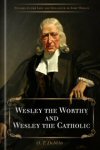
Widely known as the founder of Methodism, many scholars believe John Wesley was a profoundly ecumenical voice. This volume comprises two papers originally presented in popular journals. Each essay seeks to present Wesley as a unifying voice among all Christians, and attributes his success as a leader to his ability to draw from, and sympathize with, voices from every theological tradition. Noting that Wesley’s work created a new movement, the authors show that Wesley’s preaching only called people to the preaching and performance of the church’s gospel.
O. T. Dobbin (1808–1890) was principal of Hull College and a missionary in India. He authored many books, including The Comprehensive English Spelling Book, Conversion What it Is Not, and What it Is: A Sermon, The Personal Reign of Christ, and The Codex Montfortianus.
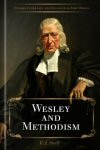
In Wesley and Methodism F. J. Snell identifies “the stages of Methodist evolution” in relation to the progression of John Wesley’s life. Snell’s work contains an introductory biography of Wesley, but the body of his work shows the congruence between Wesley’s life and the movement he began: Methodism. A critical-historical study, this volume makes a unique contribution to Wesleyan studies.
F. J. Snell (1862–1935) was a popular English artist and historian. He was educated at Oxford, and his many works include The Age of Chaucer, The Customs of Old England, The Fourteenth Century, and Handbook to the Works of Dante. Snell also contributed to the 1911 edition of the Encyclopaedia Britannica.
The Real John Wesley presents a collection of biographical portraits that depict John Wesley in the various vocations he occupied during his life. These roles include Wesley as a missionary, educator, reformer, father, husband, and more. Each essay illuminates Wesley from a vocational angle, and together they present an accurate sketch of his character and life.
William Henry Meredith (1844–1911) was a historian and an Episcopal Methodist minister. He wrote several books, including Pilgrimages to Methodist Shrines, John Wesley: His Courage and Ambition, and Jesse Lee: A Methodist Apostle.
About John Wesley
John Wesley (1703–1791) is recognized as the founder of Methodism. An acclaimed preacher, Wesley traveled extensively on horseback and drew large crowds for his outdoor sermons. A contemporary of William Wilberforce, Wesley strongly opposed slavery in England and the United States. His influence upon modern Christianity is demonstrated by the persistence of Methodists all over the world. He wrote many books and sermons, including his famous Explanatory Notes upon the Old and New Testaments.
Reviews
1 rating

Scott J Sherwood
5/23/2016

Christopher B
12/29/2015
I have one small correction to offer: Robert Southey did indeed write a biography of Horatio Nelson (1758-1805), but the latter was clearly not a sixteenth or seventeenth century figure.
